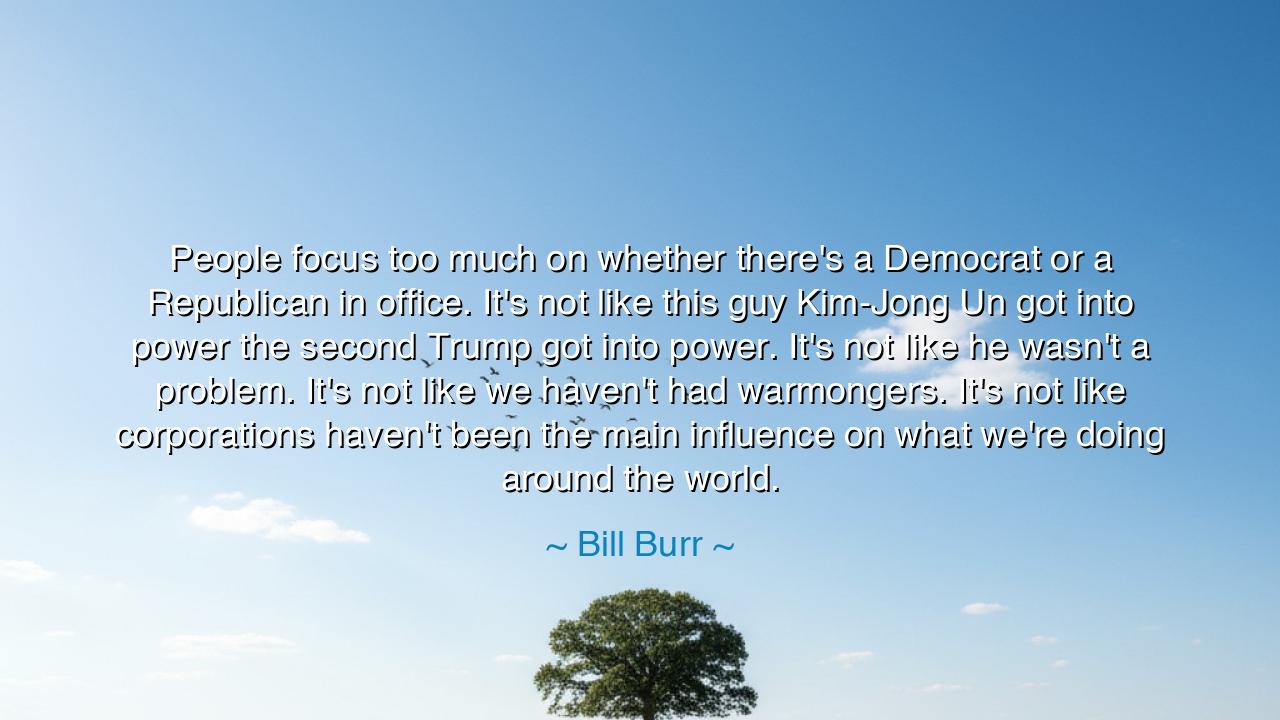
People focus too much on whether there's a Democrat or a
People focus too much on whether there's a Democrat or a Republican in office. It's not like this guy Kim-Jong Un got into power the second Trump got into power. It's not like he wasn't a problem. It's not like we haven't had warmongers. It's not like corporations haven't been the main influence on what we're doing around the world.






In these candid and incisive words, Bill Burr challenges the human tendency to fixate on the party or label of those in power, reminding us to look beyond the surface of politics. He observes that focusing solely on whether a Democrat or a Republican holds office distracts from deeper forces that shape the world. Issues such as the rise of Kim Jong-Un, the presence of warmongers, and the influence of corporations predate any single leader and will outlast their tenure. Burr’s wisdom calls for a more nuanced understanding of power, one that accounts for enduring structures and historical patterns rather than transient personalities.
The origin of this insight lies in the Stoic view of the impermanence of human institutions. Philosophers like Seneca and Marcus Aurelius warned against placing one’s peace of mind in the hands of rulers, recognizing that the vicissitudes of leadership are constant and often beyond our control. Burr’s words echo this timeless truth: real understanding comes not from partisanship, but from seeing the larger forces—geopolitical, economic, and social—that persist across administrations and influence the course of nations.
History provides many striking examples. Consider the Peloponnesian War, where Athenian and Spartan leaders came and went, yet the underlying conflict between the city-states, their ambitions, and their economic interests endured. The fates of these civilizations were shaped less by individual rulers than by the enduring pressures of power, resources, and ideology. Burr’s reminder that problems do not arise overnight with a new leader reflects the same understanding: long-standing forces shape events far more than the personalities in office.
Burr also calls attention to the role of corporations and systemic influence. From the East India Company’s sway over colonial India to modern multinational conglomerates shaping foreign policy, history demonstrates that wealth and organizational power often wield greater influence than the public rhetoric of politicians. By pointing to these enduring structures, he urges a deeper examination of where real decisions and consequences originate, reminding us that the world is rarely moved solely by election cycles.
Ultimately, this quote is a meditation on perspective and awareness. Burr teaches that focusing on partisan divisions alone blinds us to the structural realities of power and influence. Just as ancient historians sought to understand the causes of war and prosperity beyond the deeds of kings, so too must we look beyond party lines to see the patterns that shape our lives. Let this wisdom endure for future generations: true understanding requires seeing the forces beneath the surface, the constant currents that guide the world regardless of the passing figureheads who appear above them.






HNhuynhtrang nguyen
I like how brutally honest this take is. It forces us to confront how easily we personalize politics instead of recognizing long-term power dynamics. Burr’s words make me wonder if the obsession with left vs. right blinds people from noticing how similar their outcomes often are. Maybe real reform starts when we stop idolizing leaders and start holding entire systems accountable.
BBEN
This quote hits hard because it exposes a kind of political illusion—that one person or party can dramatically change a nation’s direction. Burr’s mention of corporations being the real influence feels uncomfortably true. It makes me question whether democracy has been overshadowed by capitalism. Are political debates just distractions from the fact that money and power often dictate global decisions?
Lluu
I find this statement both frustrating and eye-opening. It challenges the idea that electing one political party over another automatically fixes things. Burr’s perspective reminds me that many global and economic issues run much deeper than elections. Still, I wonder—if the system is so entrenched, where does accountability lie? Are citizens truly powerless, or do we underestimate the influence of collective action?
TNtien nguyen
This quote really cuts through political noise. Bill Burr’s point feels cynical but also realistic—problems like corruption, corporate power, and global instability don’t begin or end with one administration. It makes me think: are we too focused on personalities instead of systems? Maybe change doesn’t come from switching parties but from addressing the deeper structures that shape policy and profit.